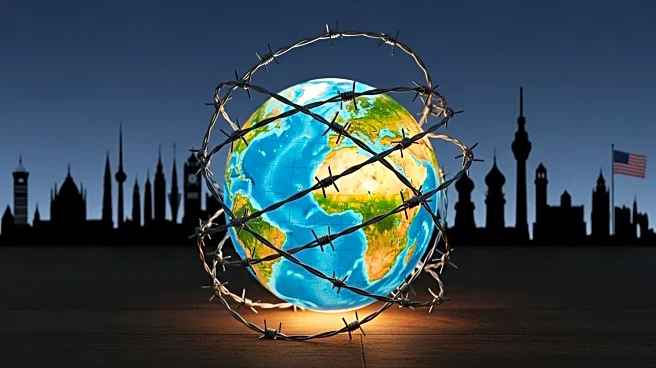What is the story about?
What's Happening?
The Shanghai Cooperation Organization (SCO) summit in Tianjin, China, is set to gather leaders from major Eurasian countries, including Indian Prime Minister Narendra Modi, Russian President Vladimir Putin, and Chinese President Xi Jinping. President Trump, although not present, is a significant topic of discussion due to his recent imposition of a 50% tariff on Indian goods, a move seen as a penalty for India's purchase of Russian oil. This tariff represents a shift in U.S. policy towards India, reversing decades of strategic partnership aimed at counterbalancing China's influence. Analysts suggest that the tariffs have pressured Modi to seek closer ties with China, marking a strategic recalibration in India's foreign policy.
Why It's Important?
The tariffs imposed by President Trump have significant implications for U.S.-India relations and the broader geopolitical landscape. By penalizing India, the U.S. risks alienating a key democratic ally in Asia, potentially driving India closer to China. This shift could alter the balance of power in the region, affecting U.S. interests and influence. Additionally, the tariffs highlight the unpredictability of U.S. foreign policy under Trump, which may lead other nations to seek alternative alliances, potentially strengthening the SCO as a counterweight to U.S. dominance. The situation underscores the complex interplay between trade policies and international relations.
What's Next?
As the SCO summit progresses, India and China may continue to explore ways to improve their bilateral relations, potentially leading to new economic and diplomatic agreements. The U.S. may face increased pressure to reassess its trade policies and diplomatic strategies in Asia to prevent further erosion of its influence. Stakeholders, including U.S. businesses and policymakers, will likely monitor the situation closely, considering the potential impact on trade and geopolitical stability. The evolving dynamics may prompt discussions on the future of U.S.-India relations and the role of the SCO in global politics.
Beyond the Headlines
The tariffs and subsequent geopolitical shifts raise questions about the ethical and strategic dimensions of U.S. foreign policy. The move challenges traditional alliances and may lead to long-term changes in global trade patterns and diplomatic relations. The situation also highlights the potential for increased regional cooperation among SCO members, which could redefine power structures and influence in Eurasia. As nations navigate these changes, the importance of stable and predictable international relations becomes increasingly evident.















